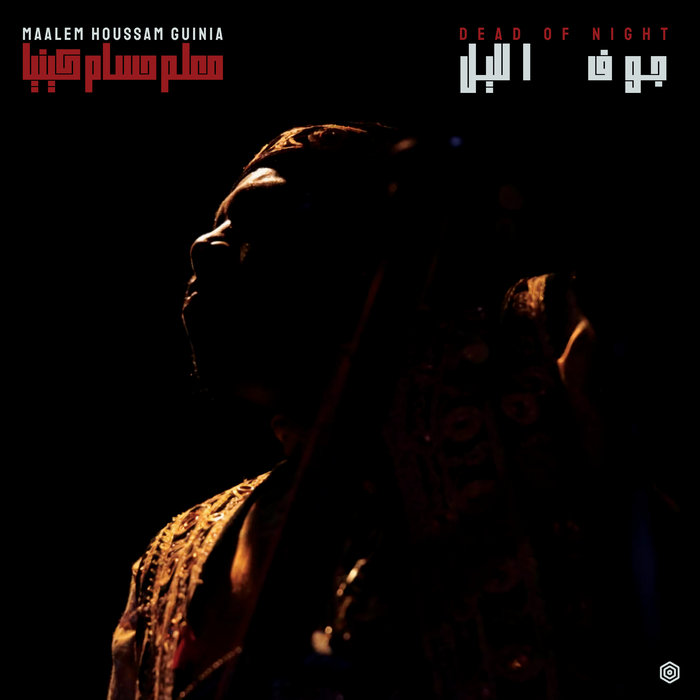The Breakdown
We should be mighty thankful for the long and strong relationship that’s grown between Brighton’s Hive Mind Records and Guinia family of Gnawa musicians in Morocco. Back in 2017, the label’s inaugural release was the first vinyl press of ‘Colours Of The Night’ by the legendary guembri player Maalem Mahmoud Guinia. It was a poignant collection of the Master’s final studio recordings which re-awoke interest outside Morocco in this seminal artist’s deeply spiritual, densely percussive gnawa sounds.
Previously this raw hypnotic intensity had drawn Bill Laswell and Pharoah Sanders to Essaouira in 1994 to record with Mahmoud Guinia plus his ensemble, a session that was captured on the seminal ‘Trance Of Seven Colors’ album. This release then prompted other western musicians, including free-jazz dynamo Pete Brötzman , to work with the guembri master. However Hivemind’s connections with the Guinia family has always centred on their more traditional, gnawa roots.
The label discovered crate-digging grail in Morocco then internationally re-issued in LP format Mahmoud Guinia’s late nineties cassette ‘Aicha’. In 2019 they also put out the powerful ‘Mosawi Swiri’ the first album by Mahmoud’s youngest son Houssam Guinia. This was an introduction for many to a musician who had played alongside his eminent father since his early youth and who the great Master considered to be his musical heir. So the arrival of a follow up album on Hive Mind from Maalem Houssam Guinia, ‘Dead Of Night’ is more than a big deal, it’s the next chapter in an ongoing, musical saga.
There’s a palpable resonance around this new recording from both its context and content. Capturing a night-long live session in a Casablancan house on a Tascam portable, the process echoes the trek that Laswell and Sanders made to the Guinia family home thirty years earlier. This time though the focus is not on ensemble playing or ‘fusionistic’ exploration. ‘Dead Of Night’ features Maalem Houssam Guinia playing his guimbri and singing the songs from his childhood that he heard his late father striking up deep into the early hours.
Such poignancy seems to shimmer through all nine songs that Houssam Guinia gifts us on the album and is heightened by the presentation of the music. Paring the tunes back to Houssam’s visceral guembri sonics and his lone vocal might seem a stark listening proposition but this makes for an unforgettable, emotional ride. As the intensity of the album ramps up with each track you never miss the chattering qraqabs and hypnotic chants that customarily give gnawa music it’s drive. ‘Dead Of Night’ presents raw exposure to the soul of this tradition.
The opener Allah Allah Daym Molana plunges you straight down to the inner sanctum, no easing in. Houssam Guinia’s athletic guembri bass limbers up through a few fluttering note patterns then goes locomotive, propelling the song but also matching his vocal delivery. That voice is a contrast to his father’s weathered, wise tone. It’s softer, not smooth but sanded, able to drift between reflection and rejoicing as the momentum gathers. At the close Houssam releases a contented sigh as the adrenaline dips.
How such rhythmic and harmonic complexity is coaxed from a three-stringed bass instrument is a mix of technique, flare, musicality and indefinable giftedness. On Jahwari Bouri Bourima the sounds shift in a blink between strongly plucked basslines and more nimble mirroring of Houssam Guinia’s singing. The closing moments, where the pulse pounds on the guembri’s shell in time with the twanging beat, is a feverish highlight.
What adds to the album’s uniqueness is the close-up recording approach used by Karl-Erik Enkleman. It’s no surprise to find out that Enkleman, as well as being a recordist and producer is also a bassist. He manages to capture the intimacy of the moment, the coughs, sighs and deep breaths, as well as the swathe of sounds that Houssam Guinia conjures from his instrument. Listening to the closing flurry of Ya Jowadi, it’s as if the guembri is alive and kicking as it clicks, creaks and groans along with the song’s forceful strum.
‘Dead Of Night’ also reveals another root of gnawa music beyond its fundamental part in trance and healing ceremonies, the connection to pre-Iaslamic, African folk song. Samaouri has the circular flow of the finest, uplifting ballad and Matinba almost stomps along to Houssam’s lingering, achingly melodic voice. There’s a reminder here of inseparability between this ancient music and so much of what has followed, from the samba to the Delta blues and beyond. Listening to the joyful swing of Jangari, you might re-imagine Huossam Guinia’s dizzyingly gutsy guembri patterns jumping out from a dusty, roadside six-string.
Fittingly the album closes with a reminder of the hypnotic, rhythmic high that is fundamental to gnawa music. On Mosawiyin (Souiri), Maalem Houssam Guinia stretches out on a marathon, long form journey of sustained, emotional intensity. There’s a tension throughout between the pure kinetic minimalism and his reverential vocals. At times he reaches down to the lowest whispered notes, carrying you with him deeper inside the song, then at others the spontaneous brilliance of the guembri responses seem to be coming from beyond the musician’s conscious control. ‘Dead Of Night’ finishes with a final string pull and a Houssam’s fulfilled gasp.
You can probably remember an artist who bowled you over from the first time you heard them. Maybe it’s a Gurrumul, maybe a Fred McDowell, maybe a Nusrat Ali Khan. Whoever it is, there’s a chance that Maalem Houssam Guinia might be adding to those memories with his irrepressible ‘Dead Of Night’ album.
Get your copy of ‘Dead Of Night‘ by Maalem Houssam Guinia form your local record store or direct from Hive Mind Records HERE














No Comment